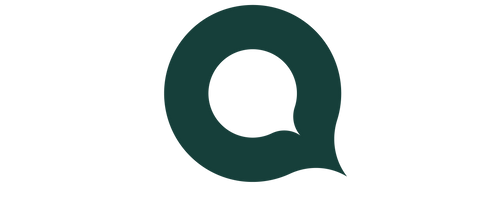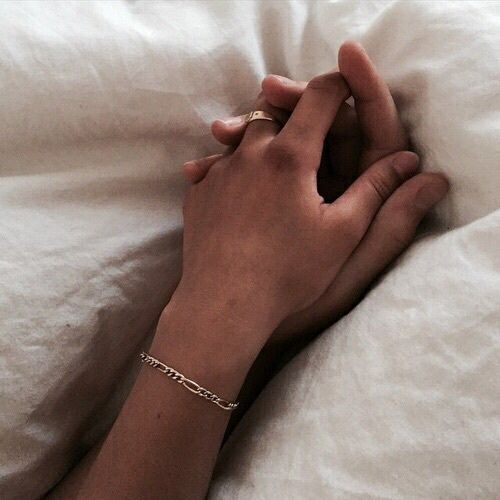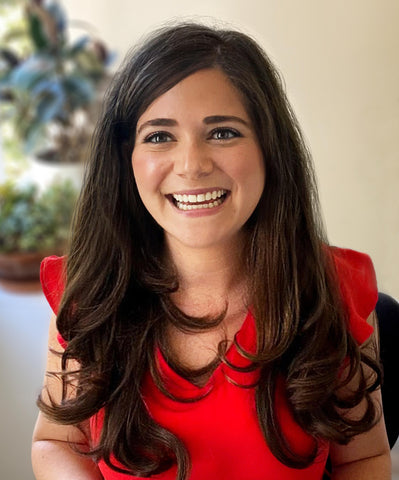
Let’s begin the conversation. Let’s rid the taboo.
By Samantha Pérez
As the holidays commence so does the kickoff of “cuffing season”, a term made popular on Urban Dictionary about 10 years ago defining the concept of the emergence of short-term relationships once October begins. Essentially, this is the moment that rom-com dreams come true, when the temperature drops and cuddling becomes second nature, all while you gain a seasonal lover to take home for Christmas. Love or a feeling close to it atleast is in the air, which is why as you learn to navigate your new relationship, Quanna wants to help you find someone who doesn’t think you’re complaining when you're trying to teach them your love language.
In this article, we have reached out to 5 incredible experts to have a bit of a chat about the psychology behind the famed love languages and perhaps the possibility of their misinterpretation - do they really translate your soul? And since this is the time that new relationships are sprouting, our experts also explore a necessary topic that requires both compassion as well as transparency — red flags. Is that funny feeling in the pit of your stomach butterflies or warnings, because sometimes they can feel the same.
Dr. Betsy Chung | @lovealways.drbetsy
Dr. Betsy Chung is a clinical psychologist in southern California. She has over 10 years experience as a mental health clinician. She specializes in helping people achieve self-esteem and healthy relationships by empowering them with a deep understanding of who they are based on what they went through. In addition to providing psychotherapy in private practice, Dr. Chung maintains a professional social media account on Instagram under the handle: LoveAlways.DrBetsy, and contributes her expertise to various media outlets including "Tyla on TikTok", and "Share Care, Inc." and has been featured in magazines like "Cosmopolitan", "The Candidly" and "Health" magazine.
Do you agree with the theory of love languages and if yes or no, why?
I'm definitely a fan of the theory of love languages. One of the most important things that Gary Chapman's book did is help people understand, express and meet each other's needs better. This book really showed people that "love" doesn't have to be this mysterious phenomenon that nobody understands anymore, and sparked people's curiosities in learning more ways to be more intentional about romantic connection.
What is/What would be your love language?
Mine would be acts of service. It makes me feel taken care of when, without prompting, my husband helps me with little things around the house, or brings me my favorite food (french fries!). What it shows me is that he's got my back even when I don't ask him to, and that makes me feel safe.
Due to the popular red flag trend, I got to ask what is a red flag you think people should watch out for while dating/in a relationship?
A huge red flag is whether it feels like the other person gives you space to be you. How do they handle disagreements? Do they seem to respect your preferences/loved ones/time? Does it feel like your feelings matter to them? Are they responsive to your needs? In healthy, emotionally fulfilling relationships, both partners work together to create a comfortable relationship that considers the unique needs of both. Our ability to show up imperfectly and authentically, yet still be loved for it, creates a sense of security.
Victory Jones | @srvj
Victory Jones is a multi-faceted creative entrepreneur, artist, sound healer, and wellness leader. Victory is Co-Founder, Creative Director & COO at The Colored Girl: a diverse global community that unites, uplifts and empowers women of color. She is a music industry veteran having worked with legends like Missy Elliott, Britney Spears, Ne-Yo, Salaam Remi, Rza & more. As a songwriter & recording artist Victory is renowned for her poetic storytelling ability and rich vocals, as well as being vocalist & writer for top NYC agencies on various advertising and cinematic projects for major brands like Maybelline & the remake of the movie Annie. Her roots in music have motivated her to integrate emotive and immersive sound for healing, helping many on their journey towards wellness.

Do you agree with the theory of love languages and if yes or no, why?
Yes, I agree with the theory, but do not believe that it is the totality of how people express & receive love. Expressions of love can be as unique & multi-faceted as the people expressing them. But the love languages are great archetypes to categorize some of the more common ways in which we relate to those we love.
What is/What would be your love language?
My love languages are all of them combined! I am not exclusively bound to one. And how can we be? I believe we can have favorites amongst them, depending upon what we prefer, mirror, or are used to. However, I believe that we can also practice loving expressions as a combination of the love languages. I don't believe any of them are mutually exclusive or that there is a superlative. I am open to receiving, giving, and expressing love in various ways depending on the vibration of the moment, the nature of the relationship, and also the way I relate to whomever at whichever specific time. It's way more fluid, dynamic, and open than an assumed static expression of just one, repeated over and over again. Also, the preferred love language of any given person may or may not change over time. It's all relative and can be contingent upon so many factors.
Due to the popular red flag trend, I got to ask what is a red flag you think people should watch out for while dating/in a relationship?
Not sure what you mean by red flag trend, but I do know what a red flag is... and again there can be many according to how we relate, what we know/are aware of, what we allow, and what our preferences are. Nothing is ever really that cut and dry or static. But if I had to delve into the world of red flags I'd ask people to look at themselves first and foremost. How are you relating to SELF when no one is watching? On an everyday consistent basis... Are you giving yourself the love you require from others? Do you treat, and speak to yourself the way you desire others to? Do you self-sabotage, self-abandon, or embody other detrimental traits that hinder you from fully expressing love to yourself, first and foremost?... because the most important relationship we have is with ourselves first & foremost, and it ripples out from there. There is a saying that goes "how you do one thing is how you do ALL things." And to me, that really rings true, as there are energetic patterns to how we perceive, approach, and express various energies. Including love, so relationships are not exempt from this. Before we look outside of ourselves judging and looking for flaws and things we do not like about how others are relating to us, I think it best to look within first. However, there are certain things that I think all beings deserve. Such as respect, reverence, grace, kindness, consideration, and honesty. I think that values such as these are non-negotiable practices that can be interwoven to create a beautiful foundation for a functional relationship that nourishes, nurtures, and sustains us. Most often we intuitively know whether or not something serves our greatest good, it's how we choose to engage that determines the outcome. So if you're looking for red flags, I'd urge you to first look in the mirror and ask "What is this reflecting back to me?" or "What is being shown/revealed to me?" through whatever it is that feels "off" to you. Relationships are multi-dimensional and have so many nuances... I find leading with love, compassion, honesty, and non-judgment is a great way to discern if something or someone is a good fit for you. But always start with Self first, before being quick to turn the lens on the other person. That level of radical accountability is an act of self-love.
Erika Lust | @erikalustfilms
Erika Lust is a prolific award-winning, adult filmmaker. Tired of stereotypical mainstream pornography that ignored women’s pleasure, Erika Lust broke into the adult industry in 2004 with her first indie erotic film, The Good Girl, a humorous take on the classic pizza boy trope and was distributed for free on the Internet and downloaded 2,000,000 times in the first few months after its release. Since that moment Erika has been leading the revolution for adult cinema that goes beyond traditional gender roles and tired stereotypes. She has an ongoing Open Call for Guest Directors to get more women, BIPOC, and LGBTQ+ people in porn, behind the camera. Her company Erika Lust Films follow eight core values and principles to adhere to an ethical production process, and Erika has played a key role in advocating for the importance of paying for your porn to ensure safe working conditions and fair pay for sex workers.
Do you agree with the theory of love languages and if yes or no, why?
I feel that there’s a bottom of truth in the theory of love languages as it’s basically based on being empathetic with your partner to know their needs and way of communication and therefore be a better lover. In my own work at XConfessions, Lust Cinema, and Else Cinema, I want to show that listening to and actively communicating is not only the safest but also the sexiest way to engage sexually with one or more partners.
When I’m on set with my performers, I want them to have the sex conversation before the sex scene to check in with each other and be aware of each other’s boundaries, likes, and dislikes. I always ask them to be as vocal as possible with each other during the sex scene if possible before letting them go with their own flow. You don’t need to be romantically engaged with someone to treat their bodies and desires with care and love; I want to show that sex shouldn’t be only about fast-paced narratives and fake moaning, but can and should be mainly about exploration, curiosity, and communication, whatever the context or relationship we’re talking about.
What is/What would be your love language?
I’d say that my primary love language is probably quality time. I’m a very active and curious person and I love to feel that I’m having a good time with my partner when we spend time together. I love going out and about, traveling (better if to escape the city to enjoy nature!), discovering new tasty recipes, or working out together. I want to explore together what the world has to offer! I need to feel that not only my partner, but my loved ones in general, are living in the moment with me engaging in healthy and fun activities - without getting distracted by social media!
Due to the popular red flag trend, I got to ask what is a red flag you think people should watch out for while dating/in a relationship?
Watch out for lovers/partners who don't really care about your boundaries and push you to do things you’re not 100% comfortable with! It’s important to be clear about what you want and don’t want just as much as it is crucial to engage with people who are able to listen and respect your dos and don’ts.
Logan Ury | @loganury
Behavioral scientist turned dating coach Logan Ury is the author of the bestselling book, How to Not Die Alone. As the Director of Relationship Science at the dating app Hinge, Logan leads a research team dedicated to helping people find love. After studying psychology at Harvard, she ran Google’s behavioral science team—the Irrational Lab.
Do you agree with the theory of love languages and if yes or no, why?
Love languages can help you understand and communicate your preferences for receiving love. It’s a great way to become more aware about what matters to you and your partner. That being said, while love languages is a useful framework, it’s not based on rigorous research. For those who want to find a more evidence-based way of looking at relationships, I’d encourage you to check out attachment theory. It’s one of the most rigorously-backed concepts in relationship science.
What is/What would be your love language?
There’s an old Mark Twain quotation that says “I can live for two months on a good compliment”. I feel the same way. My love language is words of affirmation.
Due to the popular red flag trend, I got to ask what is a red flag you think people should watch out for while dating/in a relationship?
One of the biggest red flags people should look out for is “love bombing.” A love bomber comes on really strong, tells you how much they like you, talks about all the things you’re going to do together in the future, and then pulls back.
Love bombing is one of the big problems I see in modern dating. People get their hopes up that they finally found someone great, but it turns out that person was more focused on seeing if they could make someone fall in love with them than actually getting to know the other person. They don’t take the time to check-in with their own feelings, and they don't realize the impact they have on someone when they promise the world and then disappear. The red flag to look out for is someone who comes on too strong too fast and who makes big promises before you’ve really gotten to know each other.
Rachel Wright MA, LMFT | @thewright_rachel
Psychotherapist Rachel Wright is recognized as one of the freshest voices on modern relationships and sex. She has brought her message to stages across the globe, is a Sex + Relationships Coach for SHAPE Magazine, and is the creator of the virtual workshop series What You Wish You Learned in School: Sex Ed. Currently WeVibe’s Sexual Wellness Expert, Rachel has been featured widely in the media, including on Cheddar TV, as a regular contributor to SHAPE and INSIDER, plus Cosmopolitan Magazine, PIX 11 (NYC), InStyle, Women’s Health, NBC News Radio, Refinery29, Well + Good, CTV (Canada), and hundreds of other outlets.
Do you agree with the theory of love languages and if yes or no, why?
I do! AND, I don’t think it’s the end all be all or explains every nuanced need or desire that we have in each relationship we have. It’s a wonderful tool to help understand and conceptualize how our partners give and receive love or want to be cared for — but if we only look at it as ONE way, we’re neglecting other aspects of our partner(s) and ourselves.
What is/What would be your love language?
My primary love language is physical touch — followed by words of affirmation.
Due to the popular red flag trend, I got to ask what is a red flag you think people should watch out for while dating/in a relationship?
Someone who is comfortable with ignorance. If someone is willing to throw their arms up and say “that’s just how it is,” they aren’t interested in learning and growing and for a lot of people, that’s going to be a problem at some point in a long-term relationship.
Prompt: What is your love language and red flags you look out for while dating?





